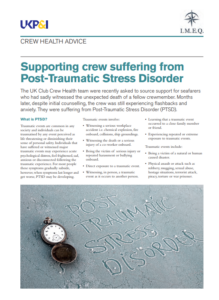Suffering with Post-Traumatic Stress Disorder (PTSD) is a common phenomenon for the seafarers’ mental health. The Crew Health team of the UK P&I Club along with the I.M.E.Q., collaborated and presented a supportive publication to aware people of the PTSD disorder issue, including some recovery tips.
Not all people who have faced a traumatic experience in the past, will suffer from PTSD, but this disorder usually comes from traumatic events or situations that are perceived as life threatening or diminishing their sense of personal safety.
Although several seafarers that have suffered or witnessed an intense situation of traumatic events, are more likely to have acute psychological distress, a feeling of fright, sadness and anxiety. It may take weeks, months or even years before these feelings make their appearance.
Signs and symptoms of PTSD:
Re-living the traumatic event through distressing, unwanted memories, vivid nightmares or flashbacks.
Feeling upset or having heart palpitations or breathing difficulties when reminded of the traumatic situation.
Avoidance of anything that reminds you of the trauma, being unable to remember its aspects.
Feeling negative emotions such as fear, horror, anger, guilt or shame.
Feelings of detachment from others and a sense of limited future.
For most people, the above-mentioned symptoms usually calm in a period of time but if this situation last longer and get worse, the PTSD disorder may be presenting. Moreover, in some cases the symptoms may come unexpectedly or even triggered by something that reminds this traumatic experience, for instance a noise, image, a certain word or even a smell.
In order to free yourself from this unpleasant situation, the UK P&Club has focused on several recovery tips, some of the following are:
- Recognise that you have experienced a traumatic event and remind yourself that your responses are normal.
- Get enough sleep. Sleep deprivation can trigger anger, irritability, and moodiness.
- When you’re suffering from PTSD, exercise can do more than release endorphins and improve your mood.
- Reach out to someone you can connect with, who will listen when you want to talk without judging you.
- Take time to relax. Relaxation techniques such as meditation, massage or yoga can activate the body’s relaxation response and ease symptoms of PTSD.
- Avoid alcohol and drugs .When you’re struggling with difficult emotions and traumatic memories, you may be tempted to self-medicate with alcohol or drugs.
- Eat healthy. Start your day right with breakfast, and keep your energy up.
Overall, PTSD has negative results in seafarers’ health, while they are struggling to get over it. In light of the situation and in order to support seafarers who suffer from PTSD, the Seafarers UK grants “The Not Forgotten Association” and its events and activities, helping specifically the Royal Marines to pass through the disorder.
Concluding, in early 2019, ARX Maritime COO, Steve Regis, discussed about mental health issues seafarers face onboard and the challenging nature of the PTSD, from which seafarers greatly suffer.
You may see more information herebelow:





























































